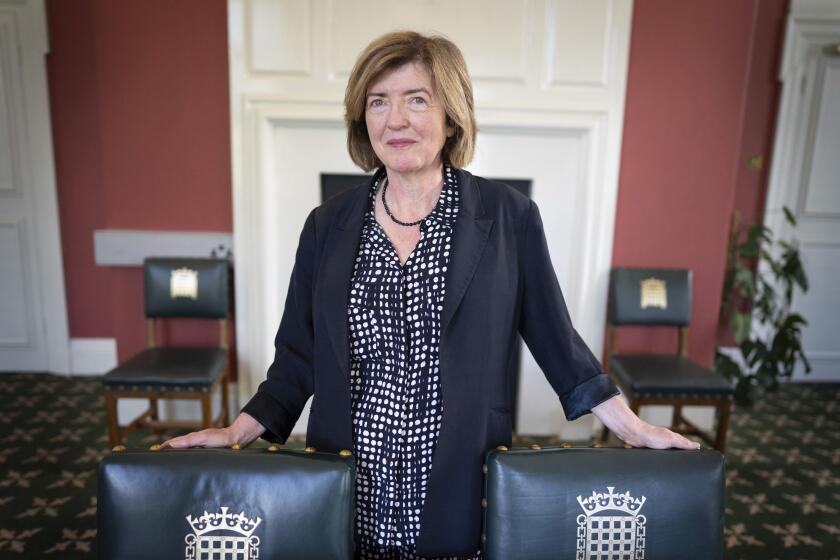Rakowski Is New Leader of Polish Party : Jaruzelski’s Support Seen as Key in Victory for Outgoing Premier
Mieczyslaw F. Rakowski, 62, the embattled premier whose economic policies have brought sharp criticism recently, won his campaign for the leadership of the Polish Communist Party on Saturday.
His victory appeared due in large part to the support of his predecessor in the post, Gen. Wojciech Jaruzelski, who resigned all his Communist Party positions Saturday in order to give full time to his new duties as Poland’s president.
The Central Committee is also expected to give its endorsement of Jaruzelski’s nomination--not yet disclosed--for the new premier but made no announcement before adjourning late in the evening.
After Jaruzelski spoke in support of Rakowski, party spokesman Jan Bisztyga said, the Central Committee elected him by a vote of 171 to 41.
Top Posts Reshuffled
After his election, the combative Rakowski, who has campaigned for the leadership post with a strong appeal to party conservatives, set about reshuffling some key policy-making and executive posts in the party.
In addition to Jaruzelski’s formal resignation from the policy-making Politburo, four other Politburo resignations were announced, along with three immediate replacements.
In the Central Committee Secretariat, the party’s executive arm, five resignations were listed.
The resignations appeared to reflect the party’s dissatisfaction and alarm over the its poor showing in the June elections, as well as a desire to advance what it hopes will be younger and more dynamic representatives to help it survive in the rough-and-tumble of Poland’s newly competitive political system.
Bisztyga characterized the Central Committee’s two-day debate as “critical and controversial,” which only hinted at the party’s inner turmoil over how much and how fast to change.
Significant Change
The new party arrangement itself is a significant change in the Communist world, where the top post in the party is also the most powerful post in the country.
Among the party heavyweights submitting their resignations were Jozef Czyrek and Stanislaw Ciosek, who quit both the Politburo and Secretariat. Both men were key party strategists and participants in the “round-table” discussions that led to the legalization of Solidarity and the subsequent June elections, which saw Solidarity candidates win 99 out of 100 seats in the Senate and all 161 seats in the Sejm, or the lower house of Parliament, for which it was eligible to compete.
Although the party now has little choice but to accept the arrangements arrived at in the round-table talks, some party hard-liners still believe that the discussions with Solidarity--much less the elections--should never have been held.
In addition, two officials who had key roles in the elections submitted resignations. Kazimirez Barcikowski, who headed the Communist coalition election commission and who designed the ill-fated “national list” of party candidates for the election (who lost even though they were unopposed), resigned his Politburo post. And Zygmunt Czarzasty, the party’s “campaign manager,” left his job on the Secretariat.
3 New Appointments
The three new Politburo appointments amount to a nod toward party conservatives and an effort to inject new blood into the leadership. For the conservatives, Rakowski nominated Manfred Gorywoda, the long-time Katowice party leader, and Janusz Kubasiewicz, Warsaw party chief. The other appointment, Leszek Miller, is one of the most articulate of the party’s young activists and is regarded as a liberal.
Alfred Miodowicz, the combative and often rebellious leader of the official trade union federation, also resigned from the Politburo.
Wladislaw Baka, an economist, and Marian Orzechowski, the party’s ideological spokesman, resigned from the Secretariat but retained their Politburo posts.
Baka also resigned his job as head of the Central Committee’s economic commission, in protest over Rakowski’s economic policies, arguing that the government’s economic experiments have led to rampant inflation, which is expected to exceed 200% by the end of the year.
Upon taking over as premier last October, Rakowski introduced several popular measures, such as ending gasoline rationing and easing restrictions on private business, but Poles are bitter over rapidly rising prices and the worst market shortages since the martial-law period of 1981-82.
In recent interviews in the official press, Rakowski has argued that the party should avoid splitting up and reconstituting itself, as some members have suggested. Instead, he has said, the party should become “a pragmatic” leftist party of the 21st Century.
“To be pragmatic,” he went on, does not mean to disrespect Marxism and “the historical achievements of Polish socialists and communists.”
More to Read
Sign up for Essential California
The most important California stories and recommendations in your inbox every morning.
You may occasionally receive promotional content from the Los Angeles Times.










